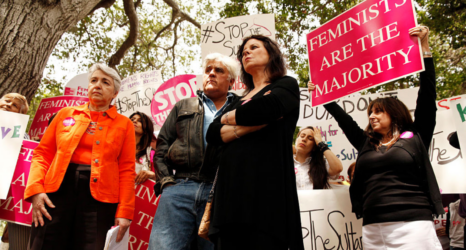The vast pro-choice religious community in the United States could provide the moral, cultural and political clout to reverse current anti-abortion policy trends.

These are certainly difficult times for those seeking to access or provide abortion and broader reproductive health care. As a researcher and writer who has followed the Christian right for the past four decades, I can say that these developments are not surprising. The Christian right has been unambiguous about their long-term project to take the Supreme Court and other institutions of government in order to gain power sufficient to implement their agenda.
But beyond the current political tangles, there is good reason for hope for a political future that is much brighter than the current legal and judicial situation may suggest. There is a vast pro-choice religious community in the United States with the potential to provide the moral, cultural and political clout to reverse current anti-abortion policy trends in the United States.
This is well documented by reputable polling and a study of religious institutional support for abortion rights. Most, but certainly not all, of this cohort are Christians and Jews. Nevertheless, the pro-choice religious sector is not much recognized in the political world, by the media and by elected officials. But it ought to be.
While a long term Pew study shows that public support for legal abortion in the United States has fluctuated a bit over the past quarter century, the historic trend is upward, and has remained relatively stable over the past five years. Currently, 59 percent say abortion should be legal in all or most cases, while 39 percent say it should be illegal in all or most cases. Other reputable polls have shown similarly increasing support for abortion rights, and have been widely reported.
The Roman Catholic Church, by far the largest Christian group in the U.S., is institutionally opposed to abortion in all instances, but, as Pew reported this year, 55 percent of rank-and-file Catholics believe that abortion should be legal in all or most cases, joined by 64 percent of Black Protestants and 63 percent of non-evangelical white Protestants. Pew data also reveal significant pro-choice minorities among Mormons and white evangelicals.

The core of support in the organized religious community are mainline Protestant denominations, notably The Episcopal Church, the United Church of Christ, the Presbyterian Church (USA), and the Evangelical Lutheran Church in America, along with most of organized Judaism. There are also deeply considered pro-choice theological traditions within all of major world religious traditions present in the United States, including Buddhism, Hinduism and Islam. Like Catholics, 55 percent of Muslims in the United States support access to abortion in all or most cases. Taken together, these religious traditions have vast resources, institutional capacity, historic and central roles in many towns and cities and cadres of well-educated leaders at every level.
These historic pro-choice religious institutions bring a tradition of democratic governance, and a broad respect for the values of religious pluralism, equality and separation of church and state—the constellation of values that comprise what we have called religious freedom.
There are also pro-choice religious groups focused on advocacy, education and access to services. These include the Religious Coalition for Reproductive Choice, Catholics for Choice, Just Texas and the National Council of Jewish Women.
A movement of the pro-choice religious community would bring fresh religious, cultural and political visions, organizations, and actions into politics and culture at a time when we surely need it. That the pro-choice religious community is under-recognized, under-resourced, under-reported on and under-organized is both the challenge and the opportunity.
The Christian right’s approach to the long game of electoral power politics has resulted in a shrinking minority led by white evangelical Protestants exercising electoral power disproportionate to their numbers. According to data compiled by Public Religion Research Institute, from 2006 to 2018, the white evangelical Protestant share of the national vote increased from 23 percent to a steady 26 percent, even while its share of the population declined from 23 percent to 15 percent. The political implications are clear: While the Christian right and the anti-abortion movement leads, it could be dethroned.
The Christian right makes extraordinary efforts to find, involve and turn out voters—while the pro-choice religious community generally does not. In fact, there are no big or small politically-oriented pro-choice religious organizations anywhere to the left of the religious right. But there could be.
Up next:





